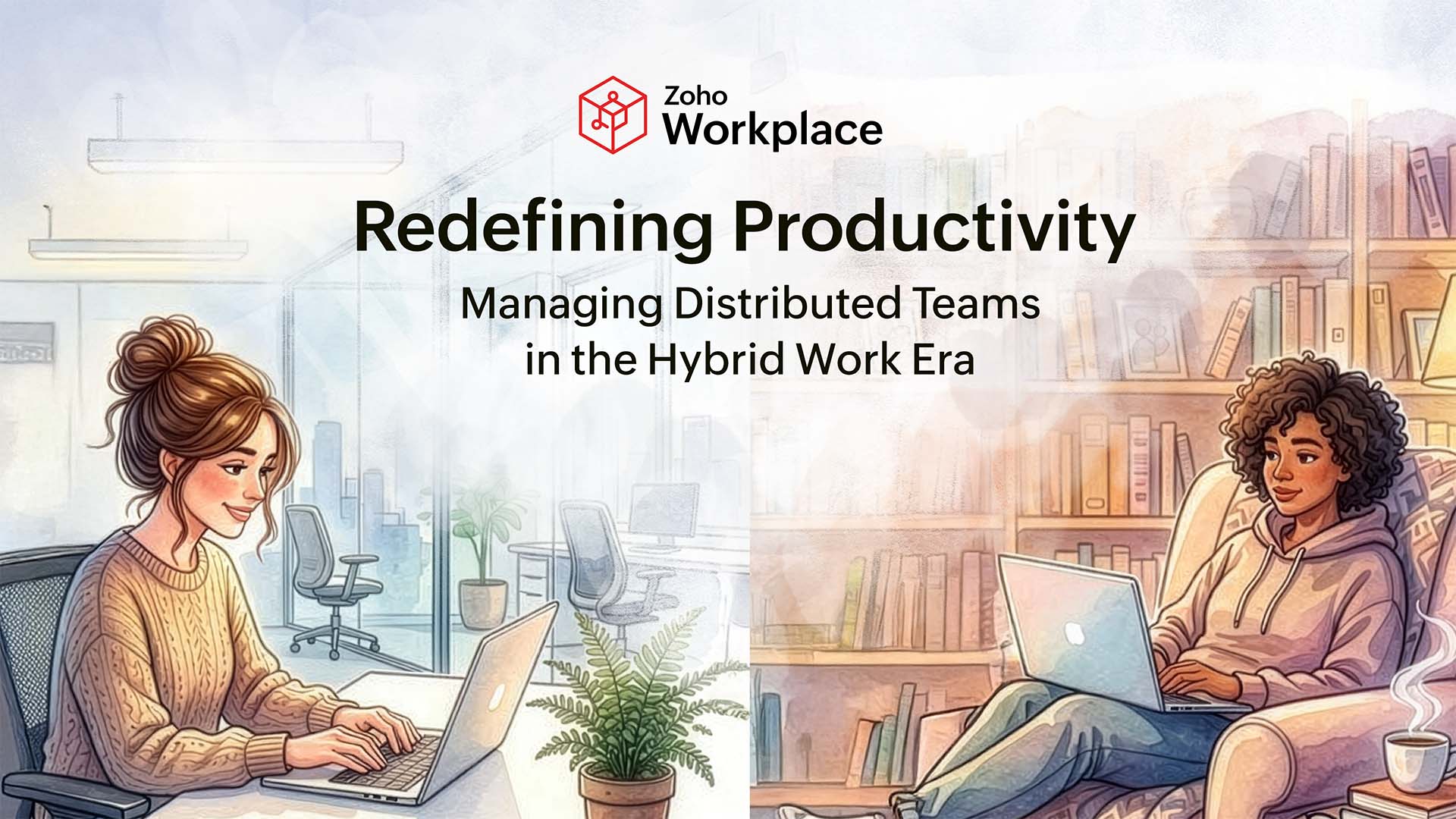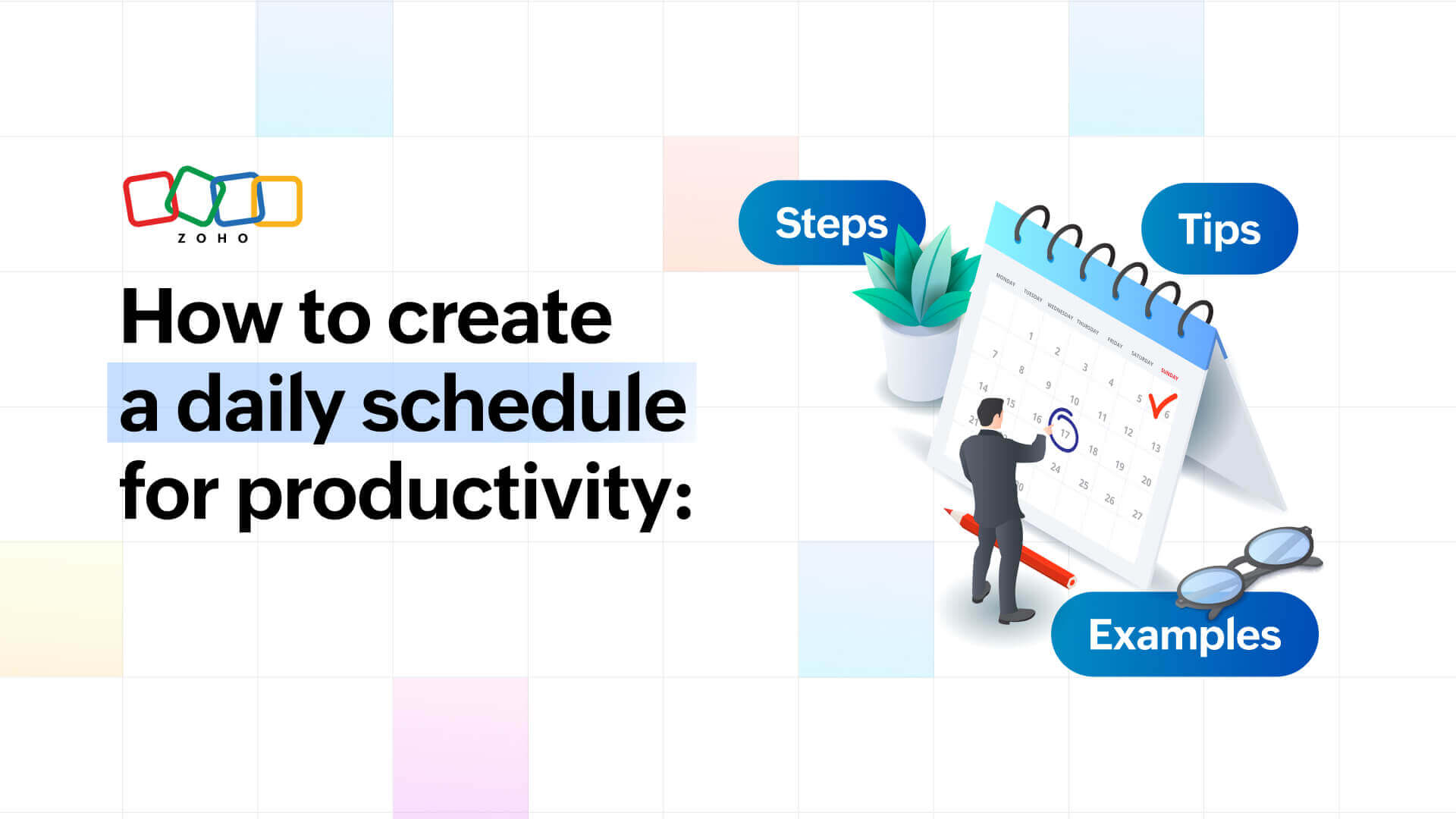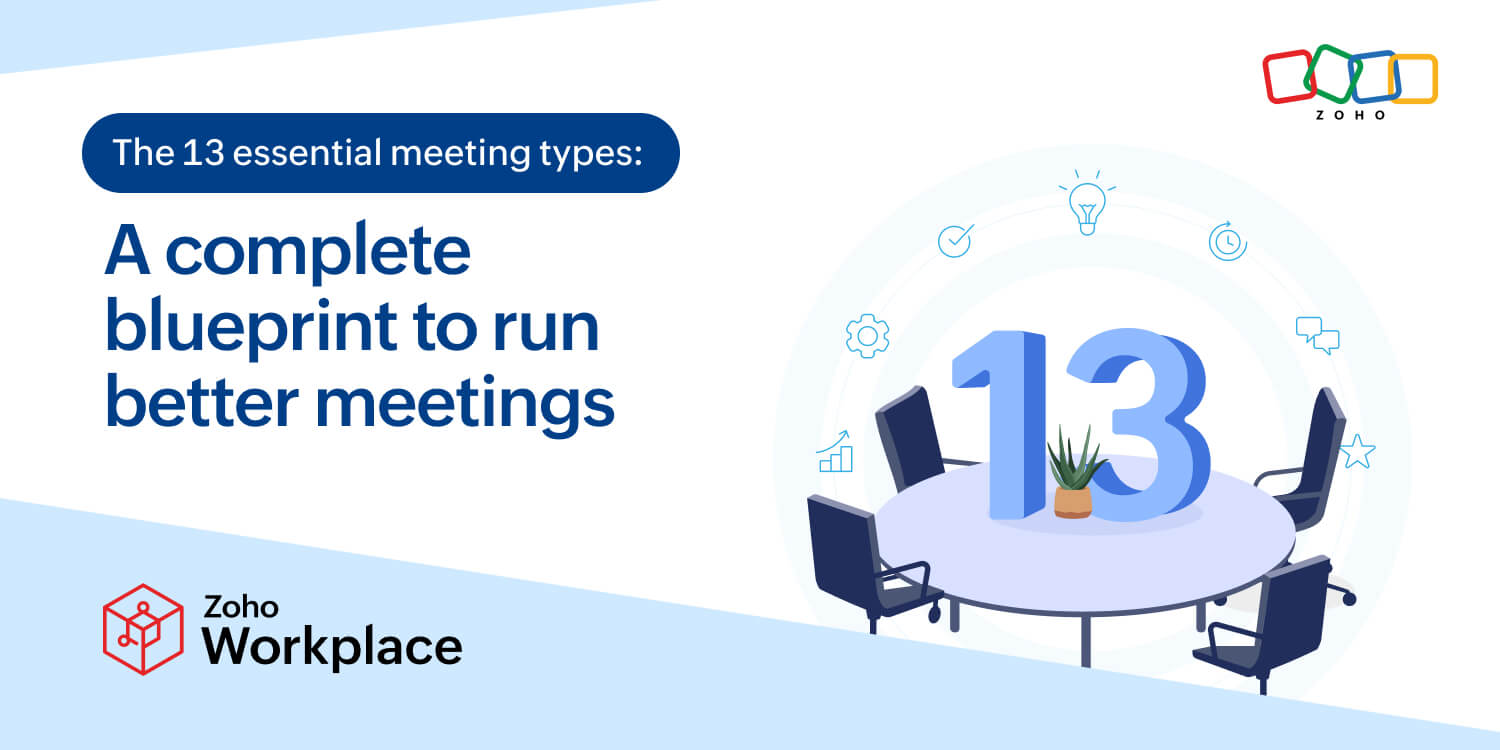- HOME
- All Topics
- Productivity in the workplace
- Deep work: The golden principle for prolific results
Deep work: The golden principle for prolific results
- Published : January 30, 2024
- Last Updated : March 19, 2025
- 3.4K Views
- 10 Min Read
In this day and age, our attention is stretched thin, and our focus wanders to multiple places at once. It’s easier than ever to be busy and still not get any meaningful work done. Just when you thought that you would have a productive day, you find yourself sucked into a loop of "shallow work," such as answering emails, manual admin work, constant notifications, and other works of insignificant nature.
Enter deep work, a term coined by computer science professor Cal Newport. This concept emphasizes focusing all of your attention and energy on one meaningful task at a time and being highly intentional about where you spend your time. By having a time when you’re completely disconnected from anything that can pull away your focus, you can guarantee high-quality work and innovative ideas to flourish.
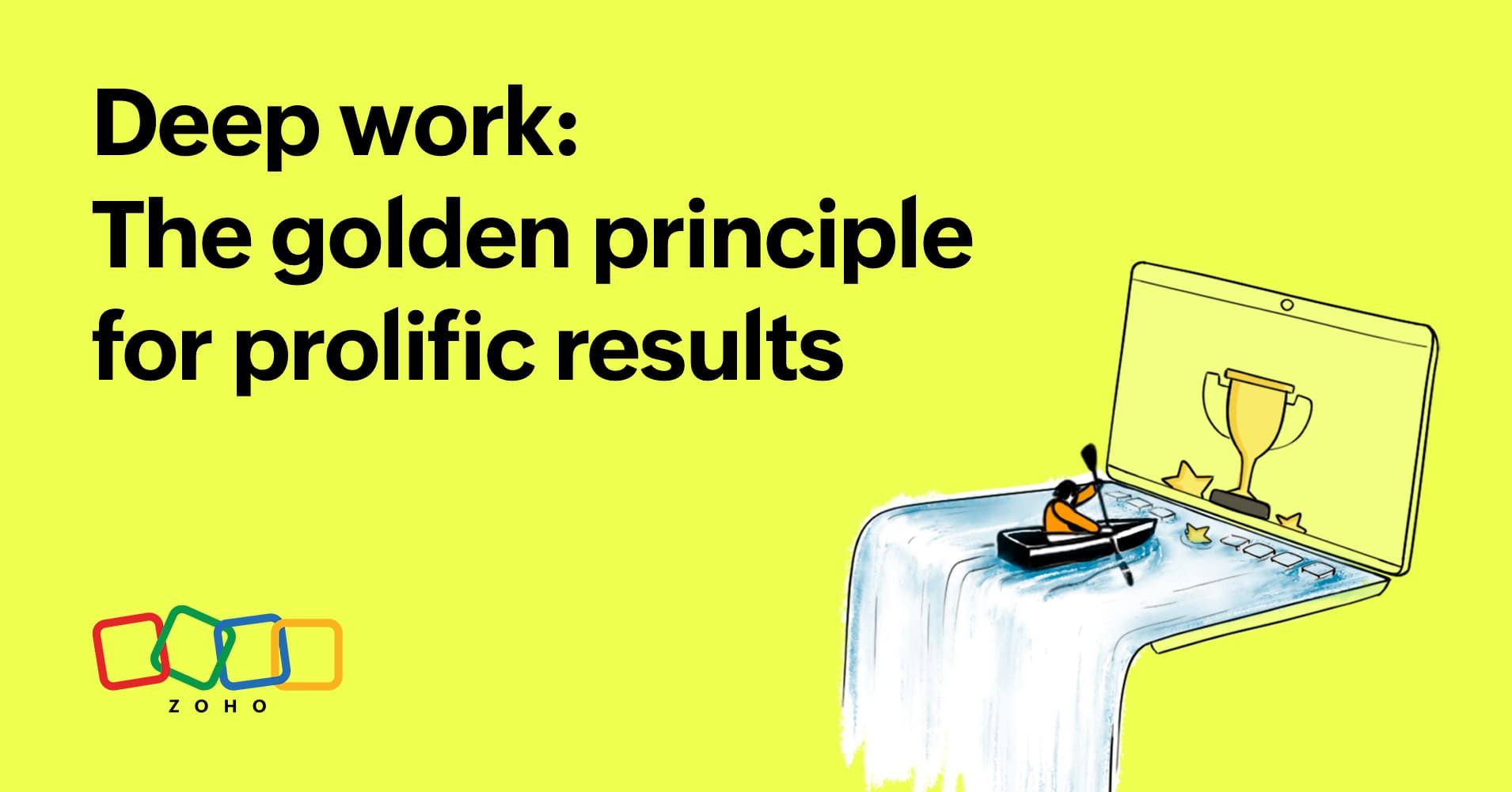
What is deep work?
Deep work is the ability to stay oblivious to the trivial distractions going on around you while staying laser-focused on the task at hand, which in turn lets you produce your best work.
In this era of scattered focus and mediocre work ethic, this theory by Newport, the author of Deep Work: Rules for Focused Success in a Distracted World, has become the remedy against unproductive practices and shallow work gripping the modern workplace.
What is shallow work?
According to Newport, shallow work is "non-cognitively demanding, logistical-style tasks, often performed while distracted." These are characteristics of busyness and not getting any meaningful work done.
Trivial tasks such as checking your emails, sending instant messages, and attending status meetings are some of the shallow work that pulls our attention away from doing impactful tasks.
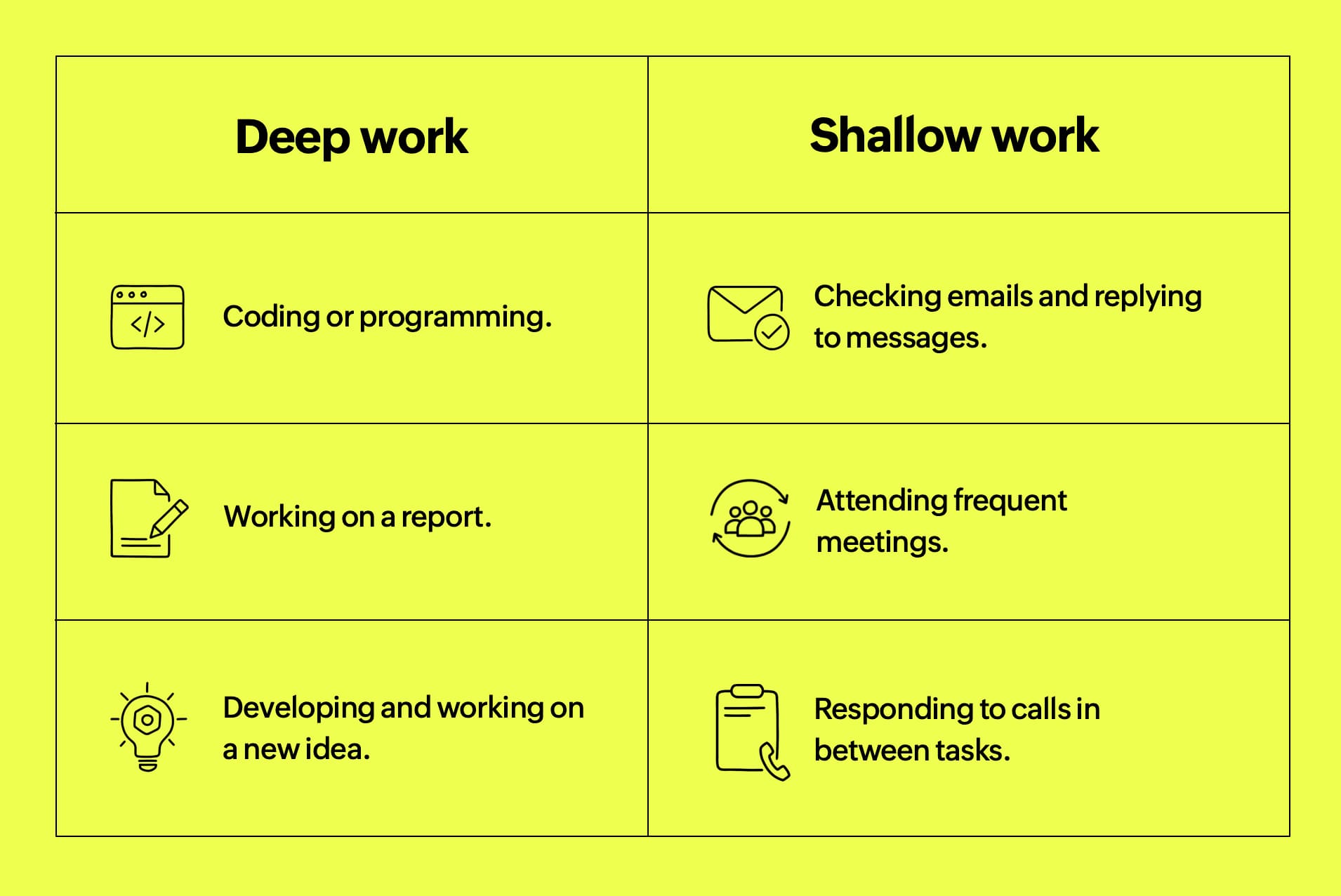
Why is deep work important?
It’s no secret that the best works in the world—impactful companies, groundbreaking inventions, life-changing medicines—didn't form by checking emails every two minutes or exchanging messages on social media.
They formed due to laser-focused attention concentrated on a single task at a time. It’s during these periods of deep work that we come up with our best work. To produce results of the highest quality, deep work is paramount.
Below are some of the undeniable advantages of exercising deep work in your daily work days.
It enhances your ability to focus.
Deep work isn’t something you read about, get inspired by, and suddenly implement in your life. It’s like building your muscle strength through training. As you slowly start to build a healthy habit of having deep work blocks in your day, your focus becomes more steadfast.
Your one hour of deep work per day will gradually turn into four hours. This increased focus will let you tackle more cognitively demanding tasks with ease and produce astounding outputs.
It lets you produce at an elite level.
Sophie Leroy, a business professor, clearly explains that the biggest foe for deep work is attention residue. If we’re constantly switching between different tasks, our cognitive bandwidth, which is finite, is split between multiple priorities. The outcome is missed deadlines and mediocre results.
But deep work lets you reclaim your focus by intentionally choosing which task to prioritize and seeing it through to the end without wavering in your attention and cognitive energy. This lets you produce results that are of the finest quality and perform at the highest level.
It’s rare in the digital age.
The digital age comes with many advantages, such as instant communication, automation, and access to information, among other things. But there are bad apples in the digital age as well, and one of these apples is depleted attention.
So, in an ocean of workers plagued by attention depletion, having the mental focus to perform deep work is precious. We live in a time where automation and AI are replacing jobs; it’s individuals with the ability to stay focused and produce exceptional results that stand out because it’s so rare.
It’s healthy.
It’s no secret that people who have separate time for work and their own personal interests are healthy. But when shallow work takes over, it’s bound to spill over into your personal time. This can deter you from having a healthy work-life balance.
But if you form a habit of deep work, you’ll accomplish more tasks faster and with better quality. This directly translates to more personal time for you. Deep work also reduces the anxiety that occurs when you don't meet your deadlines.
What are the types of deep work?
Deep work is a deep philosophy, and it comes with its own set of nuances. This isn’t a once-size-fits-all type of thing, and it varies with different people based on their priorities in their work and their personal lives.
There are four types of deep work, each with its own set of merits and demerits, but in the end, they’re guaranteed to generate high yields.
The monastic philosophy
This philosophy is strict and stringent, as the name suggests, but has the highest returns out of all other philosophies.
This philosophy straight away banishes any form of shallow work. The goal here is to maximize output by spending long days or months dedicated to the task at hand without being interrupted. The monastic philosophy is so radical that if someone is practicing this approach, chances are you might not see them anytime soon.
This is suitable for people who have complete control over their work schedule. However, as effective as this approach might be, it’s an unrealistic luxury for most people in their careers because they can't just disappear for months.
Pros
Yields the maximum possible results.
Cuts off works that are less impactful.
Cons
Not realistically suitable for most people.
Foregoes a lot of opportunities.
The bimodal philosophy
This is a slightly watered-down version of the monastic approach. Followers of this philosophy usually have two modes: long periods of deep work, followed by long periods of shallow work. This is also guaranteed to produce generational results because most of the shallow work is eliminated here.
This philosophy gives you a sense of flexibility in the way you assign days for deep work. It can either be as much as a couple of months or as little as a few days a week, and the rest of the time can be for shallow work.
People with more flexibility to choose when and where they can work are more suited to this philosophy. However, it is not a viable option for people who have unpredictable meetings and commitments.
Pros
Long, deep work time to get high-quality work done.
It’s flexible and can be adjusted to needs.
Cons
Not as effective as the monastic philosophy.
Can be tricky depending on the person's career point.
The rhythmic philosophy
If there’s a philosophy that strikes the right balance between getting epic work done and being realistic, that would be the rhythmic philosophy. This philosophy relies on habit formation because the person will set aside a specific time slot in their day, such as 8 a.m. to 11 a.m., dedicated to deep work.
There’s a sense of order in the rhythmic philosophy because it’s all about forming a strong routine and sticking to it. This is also easy for people starting out with the method of deep work.
Pros
Habit formation is a useful byproduct of this philosophy.
It can be implemented easily by almost anyone.
Cons
Doesn't allow for long, uninterrupted work hours.
Not suitable for people working day and night shifts.
The journalistic philosophy
This philosophy offers the most flexibility among all of the deep work philosophies out there. The idea behind the journalistic approach is to fit in deep work slots whenever possible. It’s most suited for people who have unpredictable work schedules.
One moment you’re sending emails, and the next moment you’re working on an important presentation deck that requires focus. The outputs of this philosophy can either be staggeringly high or apathetically low, depending on how much deep work you can fit in on a particular day.
The journalistic philosophy, with the level of flexibility it offers, may seem like a no-brainer approach for most people. But in practice, this is the most difficult one to pull off. It requires a level of mental strength and discipline to flick a switch in your mind that goes from shallow work to deep work whenever required.
Pros
Highly beneficial for people with unpredictable work schedules.
Uses every available minute and maximizes deep work slots.
Cons
Unreliable for tackling big projects.
Hard to execute because it requires a lot of deep work experience.
How do you apply deep work to your life?
Now that we've acquainted ourselves with what deep work is, the ways it helps you gain mastery over your work, and the different forms it takes, let's dive right into the tricky but rewarding part: applying it in our daily lives.
Get started with deep work using the five steps listed below, and witness your productivity and quality of work flourish like never before.
1. Choose the philosophy that suits you.
It’s natural to be tempted to choose the monastic philosophy because it has the highest impact and run with it. But we must take into account the various factors in our everyday lives. These factors may be commitments in our personal lives or work-life demands, to name a few. Pay attention to your life's ebbs and flows before choosing a deep work philosophy.
If you're at liberty to choose when, where, and with whom you work, then the monastic philosophy will be more suited to you. If you're working in a corporate environment and leading an unpredictable work life, then the journalistic philosophy will complement you.
2. Build a strong routine.
There’s a lot of scientific evidence that proves that our brain memory is associative. It can comprehend complex tasks better if we can find a pattern and form a strong association.
This can be applied to our deep work routine formation, too. Take it upon yourself to establish certain work ethics when you’re about to enter a deep work session so that your brain can associate those cues and enter a state of focused work.
Below is a sample work plan that can give you inspiration to construct a world-class routine.
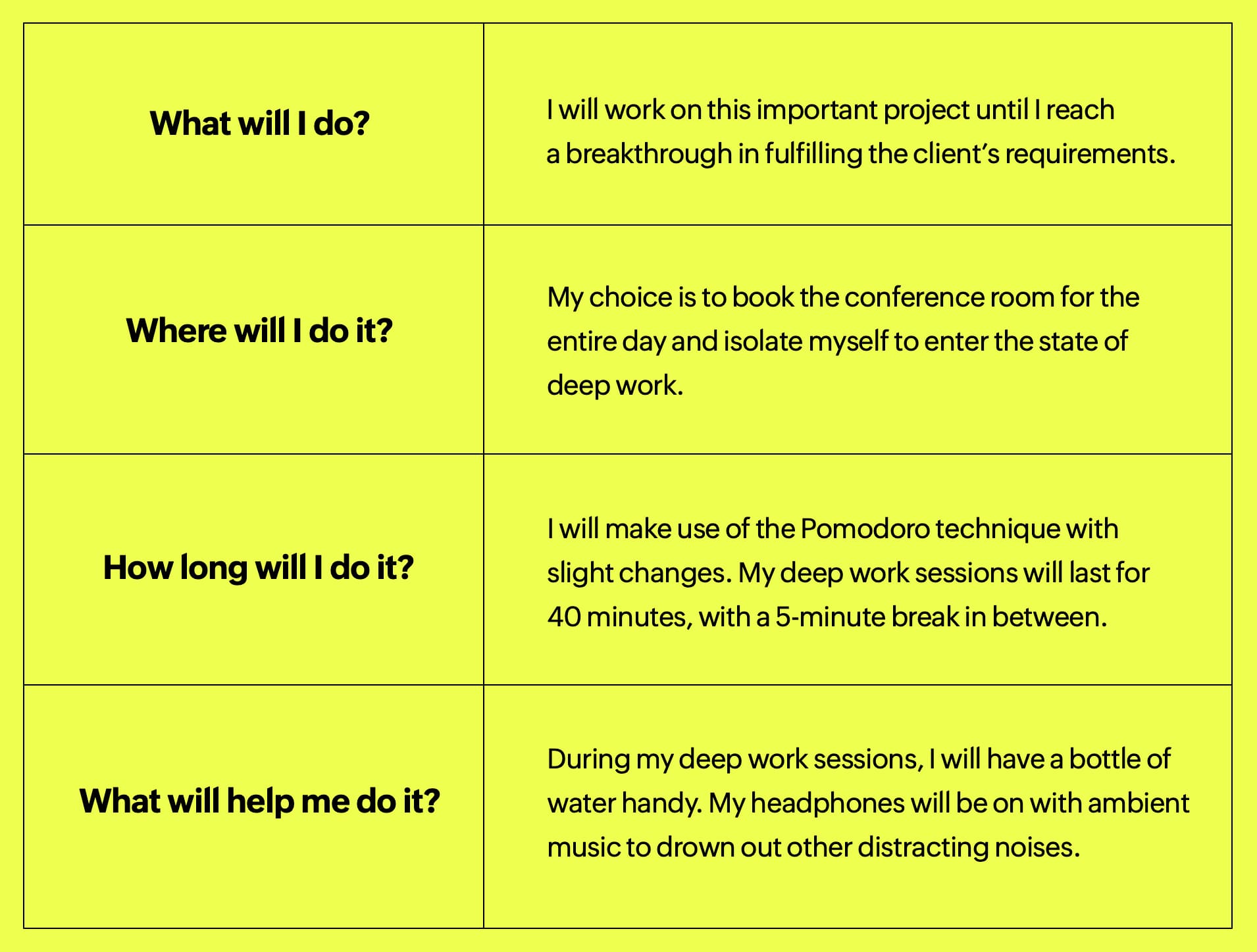
3. Cut off all distractions.
Distractions come in all forms, sizes, and times. So you have to take a multi-pronged approach to counter this workplace epidemic. Below are some distractions and how you can avoid them.
Internal distractions
In the pursuit of deep work, we don't need to seek out external factors to throw us off our free-flowing cognitive workflow. The enemy lies within us in the form of procrastination, unclear goals, and not being motivated enough. This is why having an intention before committing to deep work would be prudent.
Set clear goals, objectives, and timelines, and stick to them at all costs. Never underestimate the power of a good to-do list application to help you with this.
Digital distractions
In this digital age, it’s only fitting for digital distractions to be the culprit behind the distracted work ethics being followed by most people. Notifications from social media applications, emails, and pings from official messaging applications can pull your focus away and prevent you from entering a state of deep work.
Make sure to turn all notifications off, keep your phone out of sight, and have a designated time for accessing the internet during deep work hours. Form the discipline and control the urge to fall into FOMO, which steals your precious time. Ensure you take steps to improve your digital well-being.
External distractions
External things that amount to a loss of deep working hours fall under the external distractions category. This may seem the least threatening and the most controllable one, but it has the highest potential to hamper your ability to focus.
Normal things in your workplace, such as your colleague dropping by, construction noise from outside, and a cluttered workspace, can cause you to be the least productive and focused, no matter how hard you try to regain your concentration.
Just like anything, there are surefire ways to combat this.
Make sure to establish boundaries in your workspace by letting others know that you are in DND (do not disturb) mode. Investing in a good pair of noise-canceling headphones can go a long way toward drowning out external noises that can play with your attention span. Always pride yourself on keeping your desk free of clutter. A clear desk equals a clear mind.
4. Create a sense of accountability.
Accountability can be your strong ally in the face of adverse distractions. Always have the habit of measuring your work instead of blindly committing to deep work and assuming that you did it.
Create a system of weekly reviews to keep track of how many hours of deep work you've done this week and the number of items you crossed off from your to-do list. It's only during these times of retrospective that you can gauge the effectiveness of deep work and contemplate what worked and what didn't.
Accountability shouldn't just stop with taking stock of how long you've worked and how much work you've done. It’s time to see what has worked and what hasn't, reiterate, and commit to more meaningful deep work sessions, now armed with statistics of what has worked and what needs improvement.
5. Recharge and dive deep.
A common misconception on the topic of productivity is that long work hours are associated with getting more things done. This might hold true to a certain extent, but with deep work, our goal isn’t just getting more things done, but getting quality work done.
To achieve this, taking breaks in between is paramount. Our brain is a muscle, so with prolonged work hours, it’s bound to get fatigued and won’t be able to perform at its highest potential. So after a session of deep work, step away from your workstation and relax.
You can use this brief pause at work to spark creativity within you. This can give you unexpected insights into the work you've been doing, which in turn lets you produce high-quality work.
Apart from mental well-being and a boost in creativity, taking breaks can contribute to your physical wellness, too. Scientific studies show the ill effects of sitting for long hours. However, with small breaks, you can stretch, move, and increase your energy levels. Just remember, deep work sessions are easy if your mind and body are healthy.
In a nutshell
In the words of Newport, "A deep life is a good life." Deep work lets us lead a life that’s deep in quality, abundant in happiness, and rich in empowerment. Deep work isn’t just getting more work done and being more productive. It’s the antidote against leading a life of always being busy, having less personal time, and getting mediocre results.
Get rid of shallow work and enter a tranquil state of focus with deep work, and see your happiness and productivity reach new heights.
 Rohan
RohanRohan Samuel is a product marketer for Zoho Workplace who talks about workplace security, productivity, and collaboration. He is a highly enthusiastic writer who delights in evoking visual imagination with words. He also enjoys playing football with his buddies and traveling to new places.
